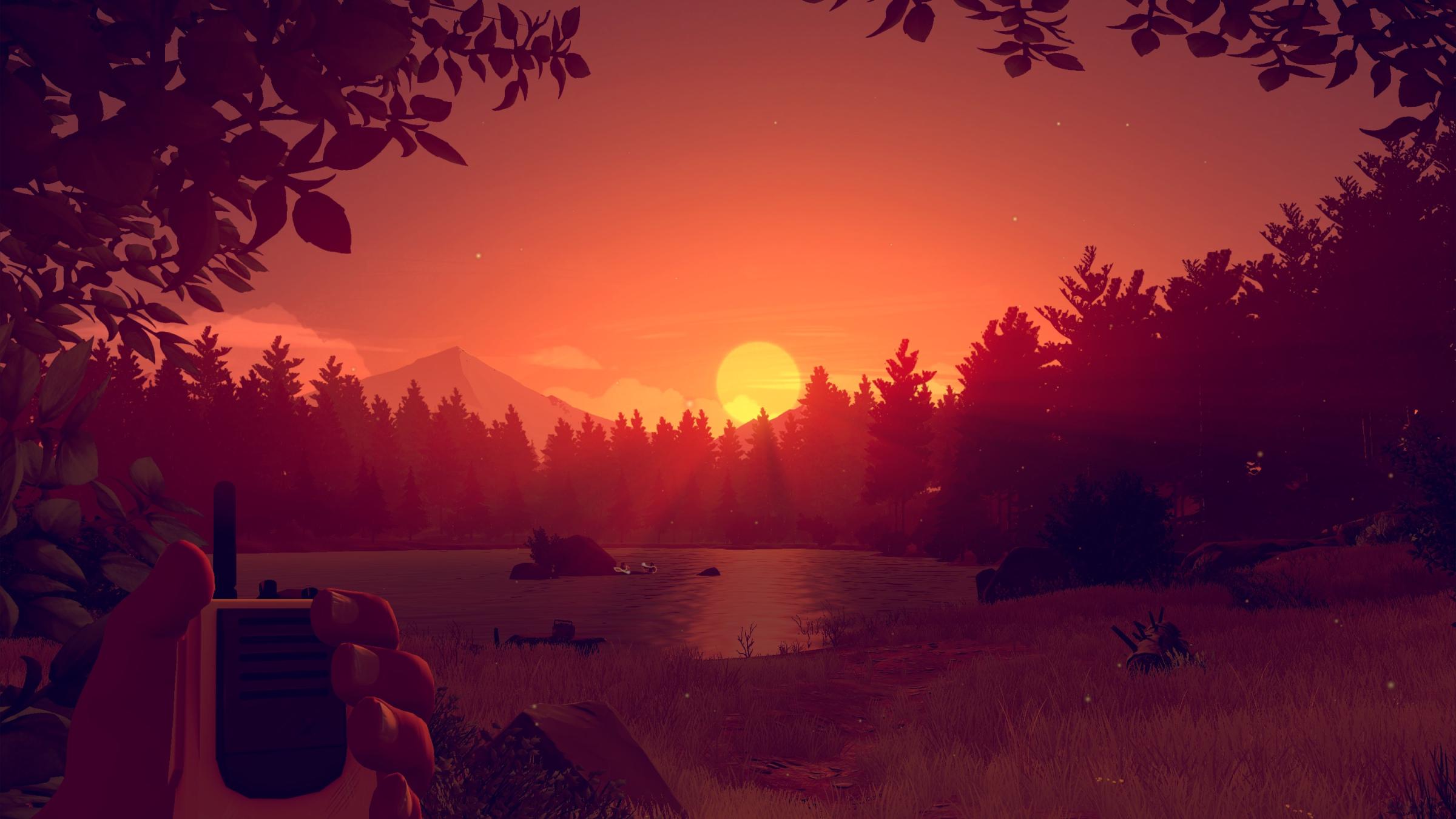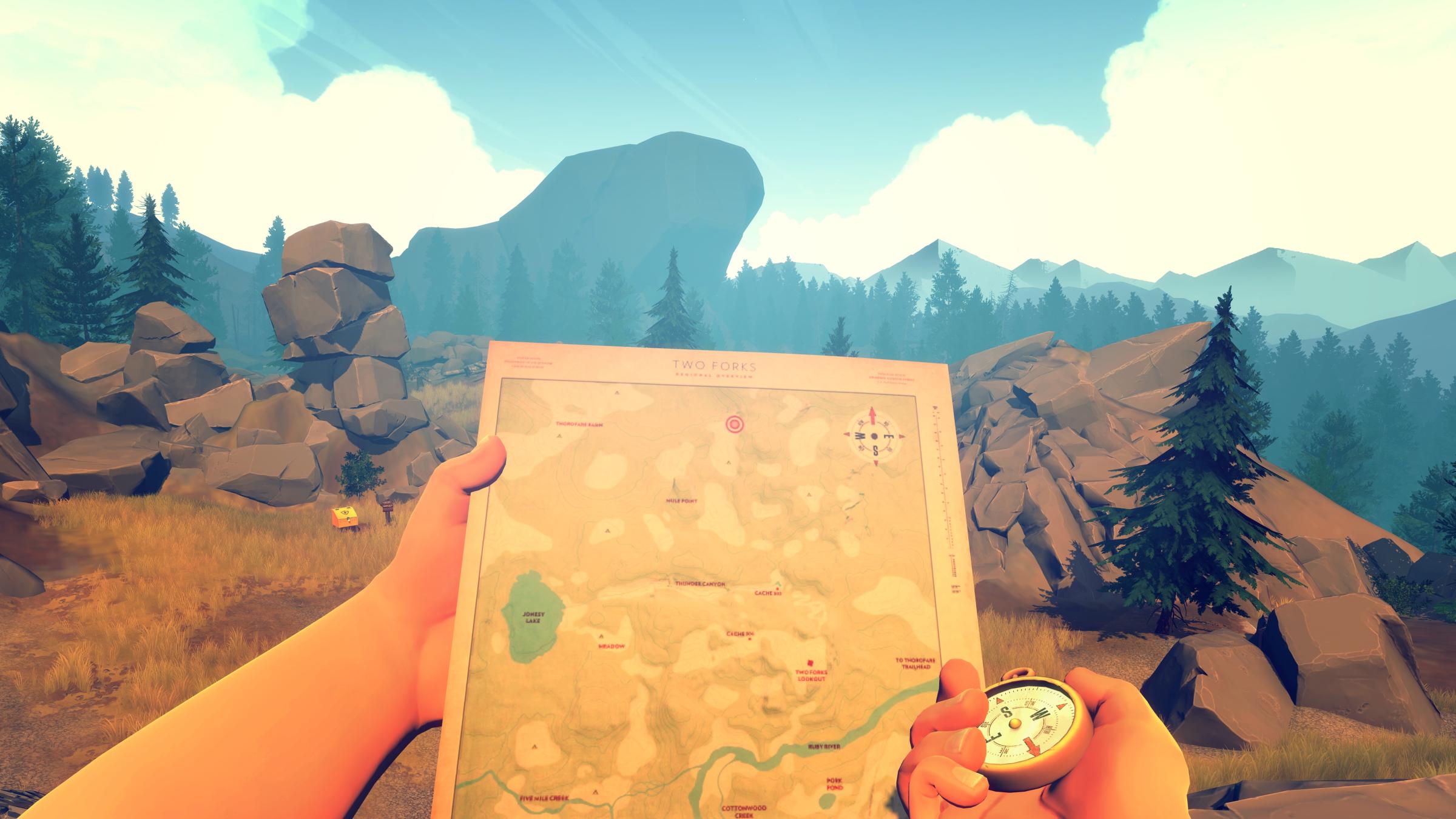Ask fans why they’re excited about Campo Santo’s Firewatch, and they’ll probably talk about its look: blazing hues of indelible Western sunsets, explosions of clouds in painterly skies, pastel vistas framed by mountains in perpetual silhouette, stands of pine, spruce and birch that evanesce into a green-gold haze. But Firewatch, out Tuesday for PC and PlayStation 4, is also a story that wrestles with more than its quotidian premise about an emotionally adrift middle-ager’s quest for solace through volunteerism. If you’ve read Edward Abbey or spent any time on BLM land, Firewatch‘s concept immediately evokes something you likely already find quite dear.
You plays as Henry, a man fleeing emotional crisis, deployed as a fire lookout to Wyoming’s Shoshone National Forest not long after the 1988 Yellowstone wildfires. Upon arriving you’re radioed by another lookout, a mysterious but affable woman named Delilah who’s also your supervisor. She doubles as your game guide and personal guru as you explore the forest’s meadows, canyons and lakes, palming a handheld radio to get her to quip about stuff you’ve found, or the places you’re going.

This happens during a lot of hiking-for-hiking’s-sake, tracking and backtracking while noting oddities or unlocking access to previously off-limits areas. Often Firewatch‘s rewards are less in the finding or doing than enjoying the stunning environment. If you’ve stumbled on Firewatch as a fan of national parks or fire control, there’s also a nod to the actual art of fire-lookout-ery as the game trots out detailed topographical maps, flora guides, supply caches and Osborne Fire Finders.
But this isn’t a survival sim, so metrics like hunger or sleep or anything remotely statistical don’t factor, nor does Firewatch ever segue to twitchy action sequences. You’ll eventually spot fires, though in what seems a missed opportunity, without once consulting the wonderfully outlandish Fire Finder. Even then, the fires are just background color in a game that’s not really about fire-watching.
A few hours in, it becomes clear you’ve instead wandered into an accidental mystery, though one whose Chekov’s gun by the end feels both forced and disappointingly underwhelming. And that’s where Firewatch veers off-key, its grand technical feat—here, artists Jane Ng and Olly Moss’ gorgeous visuals—a sublime but often vacant vehicle for what should have been a more gripping story.
It’s not without its moments. The dynamic between Henry and Delilah has to carry the game because all the drama’s invested in their friendly, goofy back and forth. Sometimes the interaction soars and you sense the promise of the deeper experience that might have been, perhaps if the new studio had had more time, or if time wasn’t the issue, been more ambitious.
But there’s just not enough to grab onto, not enough insight or anecdotal depth to connect with these characters before the tedious B-plot shows up to distract and in the end disappoint. It’s like Campo Santo built all this wonderful scaffolding to have a crack at one-upping the storied Jack-Atlas relationship in BioShock (sourced as inspiration). But then the plot turns conventionally paranoid, leaping weeks of relationship development in a single bound, so that by the end all I could muster emotionally was a shrug.

Firewatch has a few design gremlins, too. Pan the view and after a second it auto-accelerates, which can goof up your aim. Or wander freely and you’ll find the game struggling to load in scenery, which means it hitches a lot. (I played on Playstation 4.) And I’m not a fan of the way the developers modeled radio communication: The intuitive presumption that you’d want the trigger buttons on a gamepad to mirror the triggers on an actual handheld radio seems to have gotten in the way of common sense use of the face buttons and D-pad. It matters when all your responses are on a timer (not responding is a recognized choice) and you bungle the proper sequence to send a reply, which the game then parses as indifference. In a game where conversation is everything, you shouldn’t have to wrestle with the dialogue interface.
That said, I love the audacity of a game like Firewatch. Not just its grand WPA-style look, but Campo Santo’s attempt to lay out a quasi-open-world experience that’s not about fighting or collecting or “beating” anything, and where the action-adventure premise slyly becomes an experience tuned more to the frequency of a Raymond Carver or Richard Ford story. (And if you’re still on the fence after reading this, the game’s just $20.) Ultimately we need more games like this, not fewer.
3 out of 5
Reviewed on PlayStation 4
More Must-Reads From TIME
- The 100 Most Influential People of 2024
- The Revolution of Yulia Navalnaya
- 6 Compliments That Land Every Time
- What's the Deal With the Bitcoin Halving?
- If You're Dating Right Now , You're Brave: Column
- The AI That Could Heal a Divided Internet
- Fallout Is a Brilliant Model for the Future of Video Game Adaptations
- Want Weekly Recs on What to Watch, Read, and More? Sign Up for Worth Your Time
Write to Matt Peckham at matt.peckham@time.com